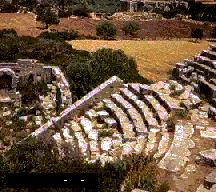 The
Phrygians are believed to have been an Indo-European people who entered
Asia Minor from Thrace about 1200 BC and seized control of the whole central
tableland. They came here from Balkans, and that is why linguists long
thought the language is more related to Thracian
than to any tongue else. But the most modern research show it was related
sooner to Armenian, though the origins
are common with Thracian and Illyrian.
The studies of the language are hardened by the fact that there is not
much to research: we can only judge by several tablets and inscriptions,
glosses containing mostly personal and placenames. The inscriptions date
back to 8th - 2nd centuries BC.
The
Phrygians are believed to have been an Indo-European people who entered
Asia Minor from Thrace about 1200 BC and seized control of the whole central
tableland. They came here from Balkans, and that is why linguists long
thought the language is more related to Thracian
than to any tongue else. But the most modern research show it was related
sooner to Armenian, though the origins
are common with Thracian and Illyrian.
The studies of the language are hardened by the fact that there is not
much to research: we can only judge by several tablets and inscriptions,
glosses containing mostly personal and placenames. The inscriptions date
back to 8th - 2nd centuries BC.
Records exist of numerous kings, bearing alternately the names of Gordius and Midas, but their power was apparently broken by the invasions of the Cimmerians in the 7th century BC. In the 6th century BC Croesus, king of Lydia, conquered all that was left of Phrygia, which passed successively under the rule of Persia, Macedonia, Pergamum, and Rome.
Phrygian was purely Indo-European, with declinable nouns having common Indo-European endings for nominative and accusative, with plenty of words stated as Indo-European. Either Phrygian was influenced by Thracian, or vice versa, anyway, much of the dictionary is quite similar. The religion of the Phrygians was an ecstatic nature worship, in which the Great Mother of the Gods, Rhea, or Cybele, and a male deity, Sabazius, played a prominent part. That was surely due to Anatolian influence which was great as well.
Herodot said, that once a little baby was experimentally placed into
the closed room, where only a silent guard entered with the food. Everyone
waited for the boy to start talking. And the first word he pronounced was
Phrygian pecos (bread), which successfully proved that the
most ancient language on Earth is Phrygian.